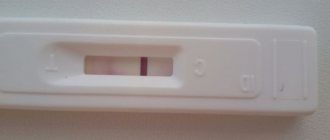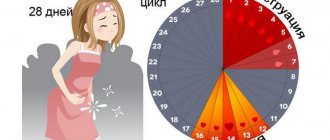Among all the unusual signs that characterize menstruation, for many the most frightening are intermittent periods. Women of all ages observe this in themselves, sometimes for no apparent reason. Menstruation begins as usual, then the discharge stops for a while, and then starts again. The gaps between them can be quite long or short, but still noticeable. What could such a change in menstruation mean: one of the normal variants or a signal of gynecological problems?
Non-pathological factors
There are a number of factors that can cause your periods to be too short. For the following periods in the life of every woman, one-day menstruation is normal:
- puberty. Over the course of 1-2 years after the first period, a teenager’s hormonal levels normalize, so during this period various menstrual irregularities may appear, including too short periods. It is important to observe whether such a phenomenon has become an isolated case or a permanent anomaly, which may be a sign of underdevelopment of the genital organs;
- premenopausal period. In women over 45 years of age, reproductive function begins to decline, and hormonal disruptions, as well as disturbances in the psycho-emotional state, are increasingly occurring;
- hormonal imbalance caused by taking drugs based on synthetic hormones. If, after taking certain hormonal-based medications, a woman’s period lasts only 1 day, this means that the drug is not suitable for her body and the medication needs to be replaced or discontinued. A number of hormone tests may be required to determine the best type of medication;
- genetic predisposition. If a woman in her family of all representatives of the fair sex had hypomenorrhea throughout her reproductive age, then for this patient short-term regulation is not pathological;
- surgical interventions, including abortions. Any operation is a strong stress for the body, which most often ends in hormonal imbalance, so it is quite natural that after surgery, menstruation lasts only 1 day;
- pregnancy. Short-term menstruation can occur in the early stages of pregnancy, and the discharge does not flow, but is only smeared and lasts no more than 2 days. If pregnancy is confirmed by a test, and the discharge is bright scarlet in color, and you feel nagging pain in the lower abdomen, you should immediately call an ambulance, because this could be the beginning of a spontaneous abortion.
There are a number of external factors of a non-pathological nature that can significantly affect the duration of menstruation:
- stressful conditions;
- unbalanced diet, strict diets that lead to vitamin deficiency;
- excessive physical activity, both during sports and at work;
- problems with excess weight, which affect the functioning of the endocrine system and disrupt hormonal balance;
- antibacterial therapy aimed at treating colds and infectious diseases.
If a woman is of reproductive age, does not take any hormonal medications, and when checking for pregnancy, the test is negative, and menstruation lasts only 1 day, the possibility of the presence of some pathology in the body should be considered.
Pathological causes of intermittent menstruation
As you know, the main responsibility in the cycle lies with hormones. Therefore, interruption of menstruation may be noticed if they begin to "become naughty." Hormones are produced by different parts of the brain and female organs. Any ill health in this area is fraught with disruptions in the cycle, including those manifested in this way. That is, the causes of intermittent periods are associated with one of the mentioned problems.
Disorders of the hypothalamic-pituitary system
Two parts of the brain, the pituitary gland and the hypothalamus, are largely responsible for providing the body with a sufficient amount and correct ratio of hormones. One regulates their production by the endocrine glands, the other produces substances that suppress hormones that are unnecessary at this stage and stimulate the necessary ones. If in any phase of the menstrual cycle there is a lack of prostaglandins, the endometrium stops exfoliating its upper part. Menstruation stops until the volume of hormones is restored to the required level.
Causes associated with diseases
If a woman previously had all the characteristics of her menstrual flow as normal, and some of the cycles lasted 1 day and ended, but the situation returned to normal next month, then there is no cause for concern. The reason is most likely a slight hormonal imbalance. If a similar situation repeats from cycle to cycle, you should definitely consult a doctor, because one-day changes can be a symptom of quite serious health problems. Hypomenorrhea can be caused by the following diseases:
- tuberculosis of the reproductive system;
- endocrine pathologies (diabetes mellitus, thyroid disease);
- inflammatory and infectious processes in the genital organs;
- ovarian dysfunction and polycystic syndrome;
- penetration of Koch's bacillus into the genitals;
- the nature of menstruation in girls during puberty can be influenced by diseases of the cardiovascular system, liver and kidneys;
- improper functioning of the pituitary gland;
- underdevelopment of the internal uterine layer.
A woman should immediately seek help from a doctor if the following symptoms appear against the background of scanty and short periods:
- pain in the lower abdomen;
- foreign impurities and odors from discharge;
- elevated temperature;
- nausea, dizziness, etc.
In this case, you should not self-medicate and hope that everything will go away in the next cycle. Only a doctor can determine the cause of such discharge and prescribe adequate treatment.
What are periods
Monthly discharge is given to a woman by nature for favorable conception and gestation of the future human being. They should be cyclical and constant - this is the main indicator of women's health.
Each body is individual, and the menstrual cycle is different for all women. On average, its frequency is 21-35 days, and spotting is considered normal from 3 to 7 days.
There are peculiarities of the body when, a few days before the expected discharge, a brown smear begins. Then it develops first into scanty periods, and then recovers to normal. This situation does not threaten anything terrible - it is a simple reaction of the body to changes in a woman’s hormonal levels.
But, if menstruation does not come, and brown spotting continues, you should be wary and seek advice from a specialist.
Let's look at the most common causes of such discharge.
Diagnostics
In order to establish the exact cause of one-day periods, the doctor must carry out a number of diagnostic measures:
- a survey is conducted during which the gynecologist finds out the characteristics of a woman’s life, the rhythm of her sexual intercourse, information about pregnancies, abortions and childbirth;
- a gynecological examination is performed on a chair with a smear taken for microflora;
- bacterial culture and cytology analysis;
- general blood and urine analysis;
- PCR;
- Ultrasound examination of the pelvic organs;
- scraping from the wall of the uterus, which allows you to assess the condition of the internal uterine layer.
In some cases, a visit to an endocrinologist may be necessary with subsequent diagnosis for endocrine diseases.
Pregnancy as a probable cause of interrupted menstruation
Everyone knows that the cessation of menstruation is one of the sure signs of pregnancy. And also that fertilization can only occur during ovulation, that is, around the middle of the cycle. The fertilized egg should then travel down the fallopian tube to where it will remain for 36 weeks. This requires little time, usually 6-12 days. So if you have intermittent periods, there can be no doubt about pregnancy. Fixation of the embryo in the uterus occurs with its invasion of the thickened endometrium, ready for this, which is full of blood vessels for its nutrition. Therefore, when screwing in the fertilized egg, slightly painful bleeding is not uncommon. In terms of time, this can happen almost at the same time as the expected menstruation. The woman is not yet aware of her situation, so she thinks that this is who she is. Implantation can last up to 40 hours. And all the time, with some intervals and pain, bleeding is noted.
When figuring out the reasons why there are intermittent periods, we should not forget about the accompanying circumstances. It is possible that to normalize the process, it is enough to restore diet, rest, and sex life. If the problem persists, it is necessary to be thoroughly examined using ultrasound, hysteroscopy and treated. After all, problems with menstruation cause difficulties with conception and pregnancy. Arbitrary self-administration of hormones or the use of medicinal plants cannot be a solution here. The variety of probable causes is so great that there is no universal way to get rid of them.
Source
Treatment
The treatment method that the doctor chooses to normalize the menstrual cycle for hypomenorrhea will depend on the cause of the disease:
- if the culprit is vitamin deficiency and an unbalanced diet, a diet in combination with vitamin complexes is prescribed. The result will be visible only after several months of vitamin therapy;
- if the cause is stress, sedatives, herbal decoctions and infusions from folk reference books, as well as special procedures may be prescribed. A change in work activity and a health-improving holiday at a resort can have a good effect;
- in case of hormonal disorders, medications containing estrogen can be prescribed, which stimulate ovulation and normalize the menstrual cycle. Such hormonal agents additionally protect against unwanted pregnancy. If hypomenorrhea is mild, you can take homeopathic remedies that do not have a contraceptive effect. An excellent substitute for synthetic hormones is tincture of clover and soy, which contains substances similar in composition to female hormones;
- for polycystic ovary syndrome, surgery may be prescribed. It is called point diathermocoagulation. During the intervention, the affected areas of the ovaries are cauterized with high frequency current. As a result of the operation, the ovulation process is normalized in the shortest possible time;
- in case of anomalies in the development of the genital organs and in case of complex gynecological diseases, one also cannot do without the help of a surgeon;
- if infectious and inflammatory processes occur, antibacterial and anti-inflammatory drugs may be prescribed. Treatment in most cases is carried out at home and hospitalization is indicated only as a last resort.
After eliminating the cause that provoked the shortening of menstruation, treatment is aimed at normalizing the menstrual cycle. For this, a woman may be prescribed oral contraceptives, a healthy lifestyle, moderate exercise and temporary abstinence from sexual intercourse.
In some cases, physiotherapy methods are highly effective in treating hypomenorrhea. Contraindications for them are tumors and inflammatory processes in the acute stage. If the regulation is too short, electrophoresis, acupuncture, treatment with leeches, paraffin and mud, and balneotherapy are very helpful. And to improve your psycho-emotional state, you may need a course of sessions with a psychotherapist.
Treatment of scanty menstruation
Treatment is prescribed by the doctor, depending on the cause of the spotting. Proper treatment is to eliminate the cause of menstruation irregularities.
In different cases, these are completely different medications or their withdrawal (in the case when hormonal pills affected menstruation).
In case of ectopic pregnancy, surgical intervention is required.
If your period is smeared but does not come and the cause is stressful situations and other external factors, non-medicinal treatment is prescribed.
First of all, these are changes in living conditions:
- Complete rest.
- Proper nutrition.
- Rejection of bad habits.
If the cause of the failure is illness, a course of medications is prescribed.










